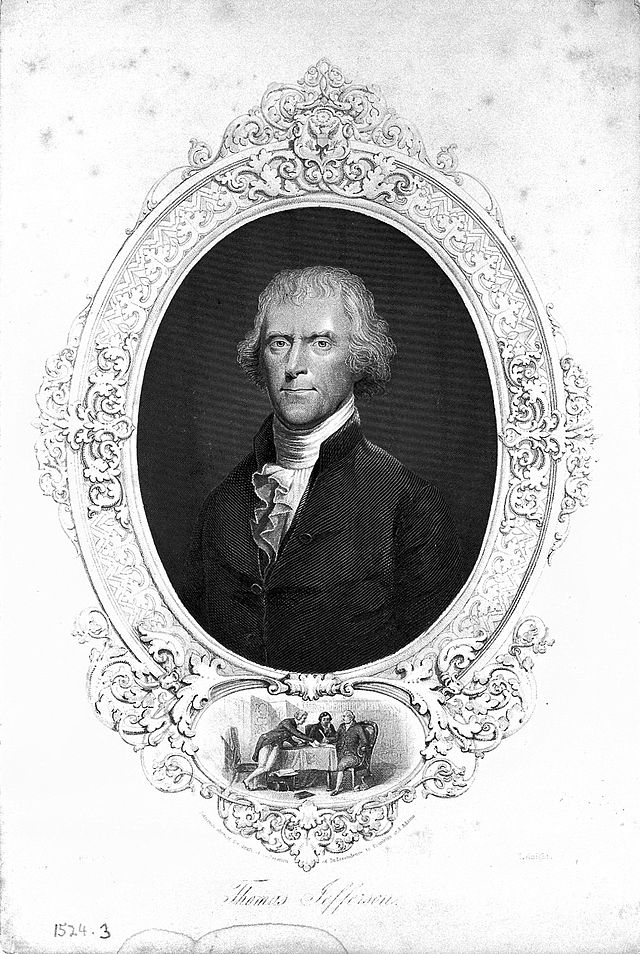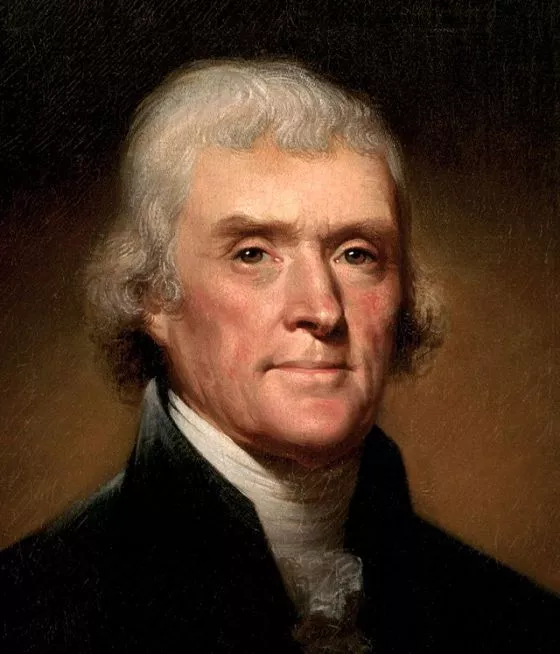
An interview with Cara Rogers Stevens
JMC Resident Historian Elliott Drago sat down with JMC Scholar Cara Rogers Stevens to interview her about her latest book, Thomas Jefferson and the Fight against Slavery. Dr. Stevens is an associate professor of history at Ashland University.
A story about people struggling with their own ideas
ED: As a native of South Africa and someone who has lived on four different continents, you have been exposed to plenty of potential historical research topics. What inspired you to become a historian of the United States?
CRS: I am a history nerd who has enjoyed learning about the history of every place that I have been, but America’s history particularly appealed to me for two reasons. First, as an immigrant, I found that visiting American monuments, museums, and battlefields helped me to feel a sense of belonging. I particularly grew to love the Declaration of Independence, with its soaring ideas of equality and natural rights. And second, because I spent part of my childhood in South Africa during its apartheid years, I was unfortunately very familiar with the ideology of white supremacy and the practice of segregation.
America’s history of overcoming slavery and prejudice by returning over and over again to the principles of the Declaration inspired me, offering me an alternative path to the one that my native land was pursuing.
ED: Scholars as well as the public cannot get enough of Thomas Jefferson. What drew you to studying Jefferson, and how do you see your work contributing to Jefferson scholarship?
CRS: Jefferson has always been interesting to Americans, though the reasons have changed with the times. He has enough controversial opinions for everyone! For me, the big question has been: How could the man who wrote “all men are created equal” also have owned slaves? The more I read Jefferson’s documents and letters, the more intrigued I became by the complicated times in which he lived.
It seemed that a key to understanding him was to understand the society into which he was born, at a time when slavery was normal and legal just about everywhere in the world (with the notable exception of western Europe).
Jefferson was on the cutting edge of freedom, as one of the first leaders to argue for ending slavery and to advocate for religious liberty, rather than mere toleration, in addition to supporting freedom of speech and press.
CRS: But his seeming inability or unwillingness to free his personal slaves bothers us greatly today (as it should), and over the last few years Jefferson’s reputation with historians has reached an all-time low.
My research offers us a new angle by which to view Jefferson: I argue that one way we can try to understand his seeming hypocrisy on the issue of slavery is by examining the younger men that Jefferson influenced. In my book, I look at Jefferson’s son-in-law, his grandson, and his “adoptive son” William Short, among others, in order to understand what kinds of things Jefferson was saying to those he trusted most, and to see whether those younger friends and relatives—all of whom were also opposed to slavery—took Jefferson’s ideas further than he could, or did.
ED: Your award-winning article on Thomas Jefferson and William Short serves as an insightful look at Jefferson’s views on slavery and emancipation. Readers might be less familiar with William Short. Who was William Short, and how did he know Jefferson?

CRS: William Short was a young neighbor of the Jefferson family, and a distant relative, whose father died when Short was a teenager. Short moved in with the Jefferson family, and Jefferson tutored Short as he studied for the bar exam. When Jefferson went to France to represent America, Short went too, as Jefferson’s private secretary. They were so close that Jefferson called Short his “adoptive son.”
Like Jefferson, Short became opposed to slavery as a young student at the College of William and Mary, and when the two men were in Paris together, they both seem to have become even more committed to abolition. Short began networking with other antislavery activists in France and England, as well as in America, and though Short spent decades in Europe as America’s first career diplomat, he never stopped thinking about how America could end slavery—and he never stopped writing to Jefferson about abolition, either. The two men exchanged a series of letters, discussing emancipation, colonization, race, and other such highly sensitive topics, until Jefferson died in 1826.
ED: Explain what you meant by Jefferson’s conclusion that the “Old World held the solution to the problem of New World slavery.”
CRS: The problem of slavery in the New World had two major components: labor and race. During the 18th century, Virginians needed affordable laborers, and plenty of them, to keep up with the demands of labor-intensive crops such as tobacco. Enslaved people of African descent provided such labor, and Virginians came to justify slavery by concentrating on the racial differences between themselves and their enslaved laborers. Enslaved African peoples were uniquely suited to unfree labor, Virginians argued, because of their racial differences (or inferiority). And because most white Virginians were racially prejudiced, they couldn’t imagine living with African-descended people in any situation other than slavery.
For Jefferson, who publicly opposed slavery in numerous ways throughout his career, this focus on race created a dilemma: he had to persuade Virginians to free their enslaved African workers, figure out what to do with the newly freed people, and find a replacement workforce.
While Jefferson was traveling in Europe during the 1780s, a potential solution to the New World dilemma came to him: the German agricultural laborers he saw in his travels would be good American citizens, just like their countrymen who already populated North American states such as Pennsylvania. If such German farmers could be persuaded to immigrate to Virginia, they would arrive untainted by prejudice against Africans, and would therefore be willing to work alongside enslaved workers.
While Jefferson was traveling in Europe during the 1780s, a potential solution to the New World dilemma came to him: the German agricultural laborers he saw in his travels would be good American citizens, just like their countrymen who already populated North American states such as Pennsylvania. If such German farmers could be persuaded to immigrate to Virginia, they would arrive untainted by prejudice against Africans, and would therefore be willing to work alongside enslaved workers.

Jefferson described his plan to Edward Bancroft in 1789: “I shall endeavor to import as many Germans as I have [adult] slaves. I will settle them and my slaves, on farms of 50. acres each, intermingled, and place all on the footing of the Metayers (Medietarii) of Europe. Their children shall be brought up, as others are, in habits of property and foresight, and I have no doubt but that they will be good citizens.” Jefferson believed that enslaved workers could transition to freedom by working as tenant farmers, or “Metayers,” alongside German workers, and the children raised in such circumstances could even be “good citizens” one day. Jefferson thus imagined a future where Old World laborers, using an Old World system of tenant farming, could help solve a uniquely New World problem.
ED: Jefferson and Short corresponded quite a bit about emancipation experiments, particularly in Virginia. Briefly describe the objectives of these experiments and why they never came into full fruition.
CRS: Jefferson and Short worked together to research metayage, an ancient European form of sharecropping. In this system, which they observed in France and Italy, land owners rented plots of land to tenants, who repaid their landlords with a large share of the harvest. Jefferson and Short came to believe that metayage could be imported (perhaps with German laborers!) to Virginia, where it could be utilized to transition enslaved workers to freedom. Short and Jefferson also speculated that by documenting the harvests of sharecroppers, they could prove to prejudiced white neighbors that African-American workers were just as capable of producing good harvests when free as when enslaved. However, as far as we know, these experiments were never implemented by Short or by Jefferson: Short remained in Europe for many years, while Jefferson became distracted by national politics (such as serving as the Vice President and President).
ED: Jefferson and Short lived in an age of multiple revolutions, i.e., the American, the Haitian, and the French. How did those events shape and complicate their visions of emancipating enslaved people?
CRS: Jefferson and Short were both inspired by the American Revolution, but they came have opposing views of the French Revolution. Jefferson left France to return to the US before the Reign of Terror, while Short remained in Europe. Short wrote increasingly desperate letters home, describing the violence and lawlessness that ended the lives of many of Jefferson and Short’s French friends. Jefferson at first downplayed Short’s concerns: “My own affections have been deeply wounded by some of the martyrs to this cause, but rather than it should have failed, I would have seen half the earth desolated. Were there but an Adam and an Eve left in every country, and left free, it would be better than as it now is.”
Over time, however, Jefferson came to see that the French revolutionaries lacked the fundamental qualities that made the American Revolution simultaneously conservative and world-changing.
CRS: On the other hand, Jefferson and Short shared many concerns about the Haitian Revolution. While they supported the desire for liberty displayed by the enslaved revolutionaries on the island of St. Domingue, they feared that the bloody uprising would spread—that enslaved Americans would follow its example. When a slave uprising was narrowly averted in Virginia in 1800, then-President Jefferson wrote to Governor James Monroe with a recommendation that accused rebels be transported to a colony out west, or perhaps to the newly independent nation of Haiti, where they would be welcomed and their actions deemed “meritorious.”
Unfortunately, the specter of violent uprising made it more difficult for Jefferson to imagine a multi-racial republic in the future; he seems to have become even more committed, over time, to racial separation through colonization. Short, who did not live among enslaved people for most of his adult life, developed a more progressive view.
ED: How did Jefferson and Short discuss mixed-race people living in the United States, and what were the limits to these types of conversations?
CRS: William Short was remarkable for his time, in that he was willing to contemplate not only a free future for America, but also a mixed-race future. Several times, he promoted the idea of freedom followed by racial intermarriage, not only to Jefferson, but also to other antislavery activists. In one letter Short wrote to Jefferson in 1798, he suggested racial intermarriage as an alternative to the “evil” of having “free people living in the same country & separated from the rest of the community by a marked & impassable line.” Because Short spent so long living in Europe, he grew accustomed to more racially open-minded conversations, and he even argued that the darker-skinned people of Spain would be a model for the race mixing that Virginia could produce. At a time when many scientists linked skin color to intelligence, Short observed that the skin tone of the Spanish did not seem to have any negative impact. Short was convinced that as science developed, Americans would eventually have to give up their prejudiced ideas about African peoples, and once prejudice subsided, intermarriage would surely occur. Of course, Short was right, but not even open-minded abolitionists in Philadelphia could agree with Short during his lifetime—he was simply able to see further into the future than most others of his generation could. In the end, Short became so discouraged with the difficulties of racial integration that he donated $10,000 to the American Colonization Society in his will, which funded overseas colonies for formerly enslaved people.
A house divided
ED: Tell us about the fascinating 1826 letter Jefferson wrote to Short regarding slavery, serfdom, and freedom.
CRS: Jefferson became increasingly discouraged, as the years went on, by how ingrained racial prejudice was in the South, and by how many southerners seemed to be embracing arguments that slavery was actually a good thing. In the 1780s, he had predicted that the opposite would occur: that the generation raised during the American Revolution would reject slavery and fully embrace the principles of liberty. Instead, he saw the country become increasingly divided over slavery. In 1826, a few months before he died, Jefferson answered a question from his “adoptive son” about whether changing the status of enslaved people to serfs might be an improvement.

CRS: Jefferson said: “the plan of converting the blacks into Serfs would certainly be better than keeping them in their present condition; but I consider that of expatriation to the governments of the W. I. [West Indies] of their own colour as entirely practicable, and greatly preferable to the mixture of colour here.” In other words, Jefferson recognized that serfs had an advantage over enslaved people, in that serfs could not be sold away from the land they labored. They therefore had greater security in their family ties, since they could not be separated easily from one another.
But where Short saw serfdom as a way of ameliorating, or improving, the lives of enslaved people, Jefferson still argued that emancipation followed by racial separation to a location such as Haiti would be better than a limited freedom with racial mixing in America.
One important question that emerges from this letter is whether Jefferson was personally opposed to racial mixing, or whether he simply argued against it because he doubted if his fellow Virginians could ever relax their prejudices to the extent needed for African-descended people to live free and equal lives in America. In my book, I discuss this question at length. After, all, given that Jefferson was certainly aware about racial mixing happening at Monticello, this letter indicates either that Jefferson had an enormous blind spot about his own racial prejudice, or that he was privately comfortable with racial mixing, and simply advocated separation publicly for the sake of public opinion.
ED: What has your research taught you about America’s founding principles and history?
CRS: The reason why America has made so many strides toward liberty and equality for all is because America started out with a founding document that included the deceptively simple statement: “We hold these truths to be self-evident, that all men are created equal.” It was so impossible for Americans to hold on to that statement and slavery at the same time that the southern, Confederate states had to reject Jefferson and break away to start their own nation, one founded on exactly the opposite principles, as the Vice President of the Confederacy said: “The prevailing ideas entertained by [Jefferson]… [was] that the enslavement of the African was in violation of the laws of nature; that it was wrong in principle, socially, morally, and politically…Those ideas, however, were fundamentally wrong. They rested upon the assumption of the equality of races. This was an error.” Not only did Vice President Alexander Stephens believe Jefferson was wrong when he asserted that “all men are created equal,” but Stephens went on to assert that the Confederacy was the first nation “in the history of the world, based upon this great physical, philosophical, and moral truth”—that “truth” being white supremacy.
Many Americans today believe that America had a racist founding, and indeed some of the founders held racist ideas. But America’s founding, based on natural equality, led to emancipation, to the 13th Amendment, to the 19th Amendment, and to so much more.
Jefferson was a deeply flawed human being, but his contribution to America’s founding principles has been a good thing for humanity.
ED: What’s one thing you wish that every student knew about American history?
American history is fascinating because Americans, perhaps more than any other nation in history, are concerned with liberty and with justice. Americans disagree, of course, about the meanings of those words, and about their practical applications. But the story of America is a story about people struggling with their own ideas, and the consequences of those ideas, rather than a people who are primarily shaped by accident and force.
Elliott Drago serves as the JMC’s Resident Historian and Editorial Manager. He is a historian of American history and the author of Street Diplomacy: The Politics of Slavery and Freedom in Philadelphia, 1820-1850 (Johns-Hopkins University Press, 2022).
